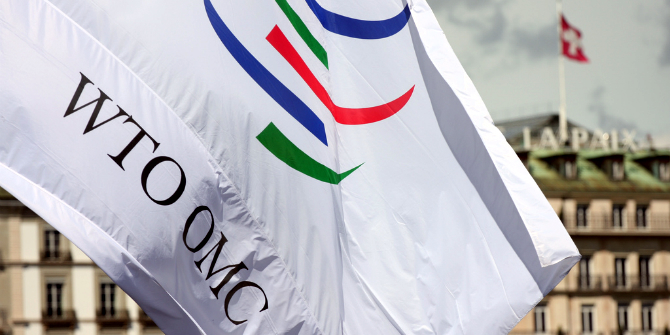 The UK has been the most successful of all the EU member states in getting its own way in the EU. We have our own form of membership. We get all the advantages of membership and we avoid some of what we have seen as its big disadvantages, writes Philip Allott (University of Cambridge).
The UK has been the most successful of all the EU member states in getting its own way in the EU. We have our own form of membership. We get all the advantages of membership and we avoid some of what we have seen as its big disadvantages, writes Philip Allott (University of Cambridge).
The Brexit negotiations have been a prolonged and hopeless effort to achieve a privileged status for the UK as a non-member state – outside the EU, but half-inside. That has been a fantasy from the very beginning. It is politically and legally impossible.

As a member state, we are not part of the Schengen Agreement which allows border-free movement of people in the EU. We retain control of immigration of non-EU citizens at our frontiers. We are involved in the intelligence and security aspects of the EU system. We are not part of the Eurozone. We have retained the pound sterling as our currency. We are not part of the Eurozone economic system which can involve intrusion into the budgetary and fiscal policies of its member states, and may involve an obligation to support Eurozone members in economic difficulty. There is no way in which the UK can detach itself from the EU unless UK business and industry and services and professionals choose to terminate their economic activity in the EU. Why would they want to do that?
The first advantage of Brexit is said to be that we would take back control over our own destiny. We would regain our ‘sovereignty’, as if we ever possessed such a thing. In fact, we would lose control over the law and government of the EU. If we were outside the EU, the law and government of the EU would still lay down the conditions of our trade with the EU member states and the conditions of the operation of UK business and industry and services and professionals in EU member states – surely a very much greater loss of so-called sovereignty.
We would not take part in the Council and Commission and European Parliament which make EU law, or in all the subordinate bodies that implement EU law through detailed regulations, or in the agencies that implement them case-by-case on a daily basis.
In all those decision-making bodies, our excellent civil servants and diplomats have played a role at least as dominant as those of any other member state. They have asserted UK interests in the drafting of laws proposed by the Commission, with the help of remarkably detailed input at the drafting stage from the EU scrutiny committees of both Houses of Parliament. The EU laws are very often exactly what we need in the UK national interest. Brexit would require us to set about the process of reproducing or replacing in UK law the many thousands of detailed laws that make up the so-called EU single market. Those laws reflect the fact that the infinite complexity and dynamism of modern industry and commerce require an immense amount of legal control to safeguard public interests, including public health and the environment and countless other matters, preventing the social damage that unrestrained capitalist competition can easily cause. Without the uniformity of such laws, their differences can be used as so-called technical barriers to trade.
Outside the EU, we would still need such laws and regulations, but we would lose control over their never-ending revision within the EU and over their interpretation and application by the EU courts and decision-making bodies to which we would not belong. There could be conflicting laws on exactly the same matters in the UK and the EU. But, in UK trade with the EU and for UK business and industry and services and professionals operating inside the EU, the EU laws would apply rather than the UK laws. How could the designer of a product design it to satisfy two different technical standards?
The second advantage of Brexit is said to be that we would avoid the jurisdiction of the European Court of Justice. In fact, we would still be subject to the rulings of the ECJ concerning the whole of the EU law which would continue to apply to our trade with the EU member states and to the operation of UK business and industry and services and professionals in the EU. The difference would be that we would not have two UK judges (on the main ECJ Court and the General Court) and a UK advocate-general. We would also not be represented in the bodies that interpret and enforce European patent law. Those bodies are vital in protecting UK companies against infringement of their patents and trade-marks by companies in other member states.
Also, UK companies would still be subject to EU control of mergers and acquisitions that take effect in any way within the EU. That control, in which we would not participate, could decisively affect the competitive position and profitability of UK businesses. The control is exercised by the EU Commission under the authority of the ECJ, on both of which bodies the UK would not be present. Once again, our representatives have been very influential in the making and application of the EU law in these matters so that it can serve UK interests.
EU law and its implementing systems control state aids to industry which can put a UK industry at a huge disadvantage in competing with industries in EU member states. The EU Commission and courts have regularly applied EU law to protect the UK from unfair competition from the other member states, not least from France. UK businesses in a wide range of industries have been safeguarded from the impact of unlawful government subsidies and from all kinds of anti-competitive abuses. UK representation in such bodies, and there are countless others, not only allows us to protect UK interests. It also gives the UK power over the treatment by those bodies of other member states and their businesses, which is itself a major UK national interest.
The third advantage of Brexit is said to be that we would recover our international ‘sovereignty’, a laughable idea given the thousands of treaties which apply to the UK and the hundreds of international organisations in which we are only one member among many. Talk about international sovereignty in the EU context involves two fundamental misunderstandings. If we were to be in some sort of customs union with the EU, we would not be able to conclude trade agreements of our own with third countries. That is one of the two defining characteristics of a customs union – no restraints on trade between the members and a single external trade policy.
Secondly, the EU customs union and single market are inseparable. The single market creates a level playing field among its members. Free trade in a customs union means that there cannot be different laws regulating industry and commerce in different members of the union. That would allow one member to block imports from the other members because the imported goods do not satisfy its internal laws on such standards as car engine emissions and the safety of medicines.
It is said that, outside the EU, we would do international trade on WTO terms. That is meaningless. The WTO operates on the basis of one general principle, and masses of implementing treaties and regulations. The basic principle is free trade, prohibiting the use of internal laws as technical barriers to trade. It was designed to get rid of the protectionism that had caused a catastrophe in international trade in the economic crisis of the 1930s.
The WTO is a free trade area on a very large scale, enforcing something similar to a global single market. The WTO system is very difficult to enforce. It has a complex and sophisticated dispute-settlement system to deal with claims by one or more states that other states have broken WTO rules. Outside the EU, the UK would immediately become embroiled in legal proceedings in the WTO and other courts and tribunals across the world, not least about our trade with some sixty countries with which the EU has trade agreements, but also about countless other non-trade agreements which rest on the basis of our EU membership.
The EU itself is in need of far-reaching reform as its leaders readily acknowledge. Membership of the EU allows the UK to play a decisive role in that process. UK consent is required for the amendment of the EU treaties that contain its written constitution and fundamental laws. It is greatly in our national interest to be able to influence the future form of the EU.
The UK, with its traditional skills of government and diplomacy and its worldwide outlook through the experience of centuries, can play a leading role in exercising the political and economic power of the EU’s five hundred million people, living in the most advanced human societies, facing an ever more chaotic and dangerous world, a world that Britain and the rest of Europe have played a very large part in causing, for better and for worse.
This post represents the views of the author and not those of the Brexit blog, nor the LSE.






